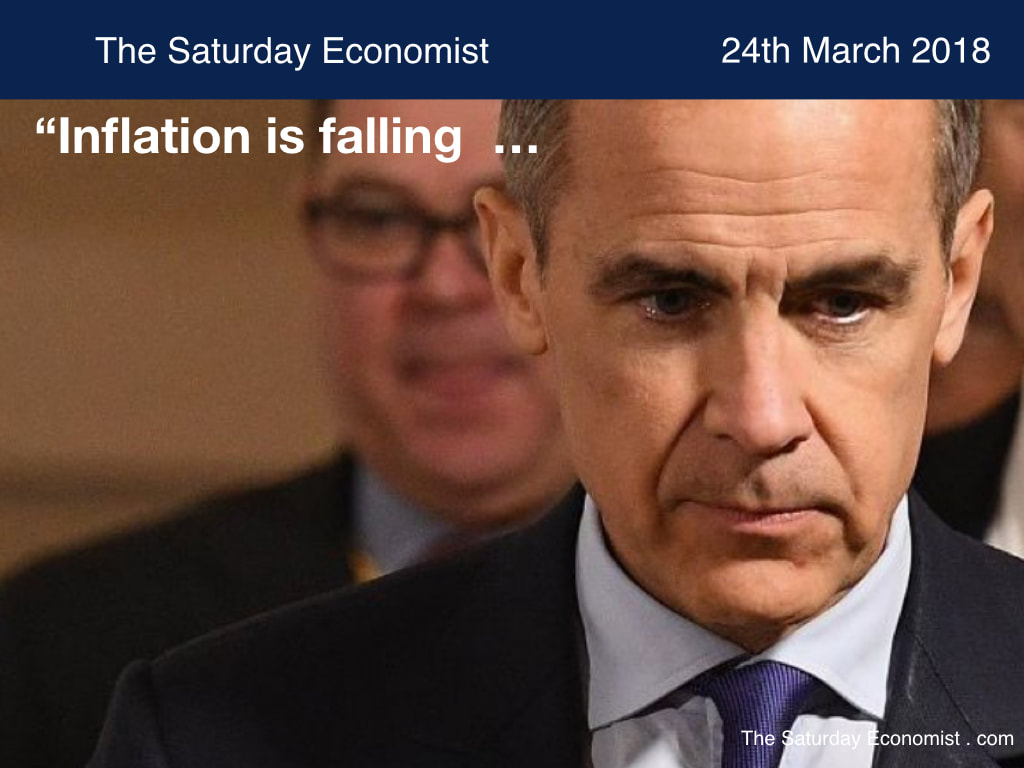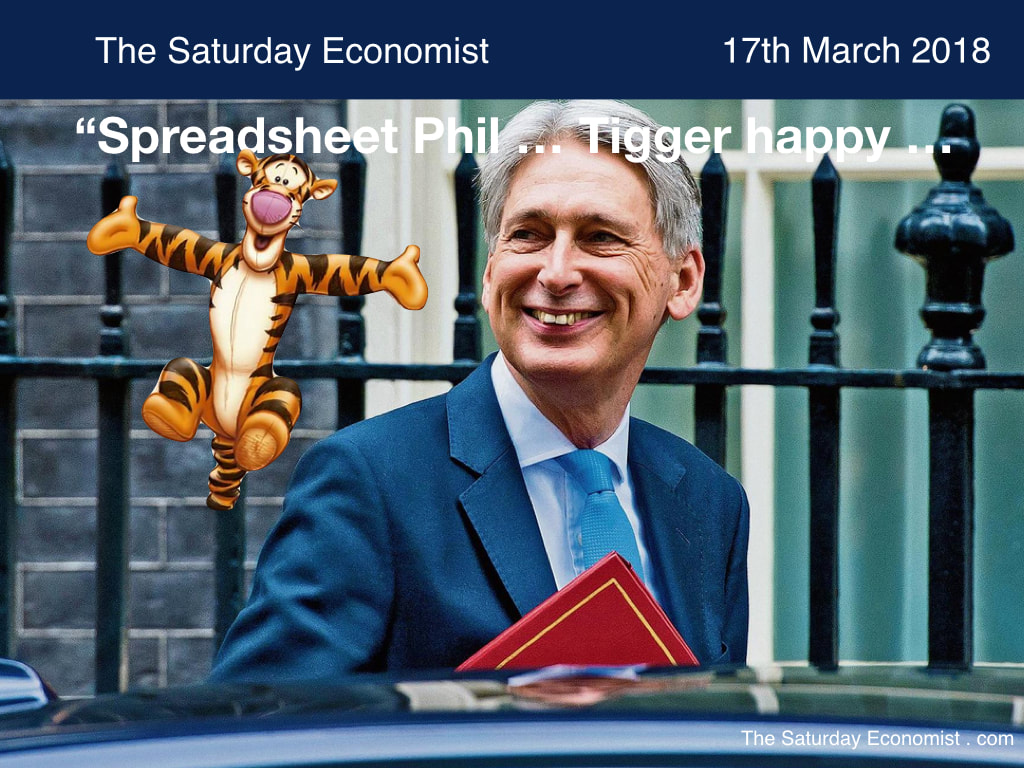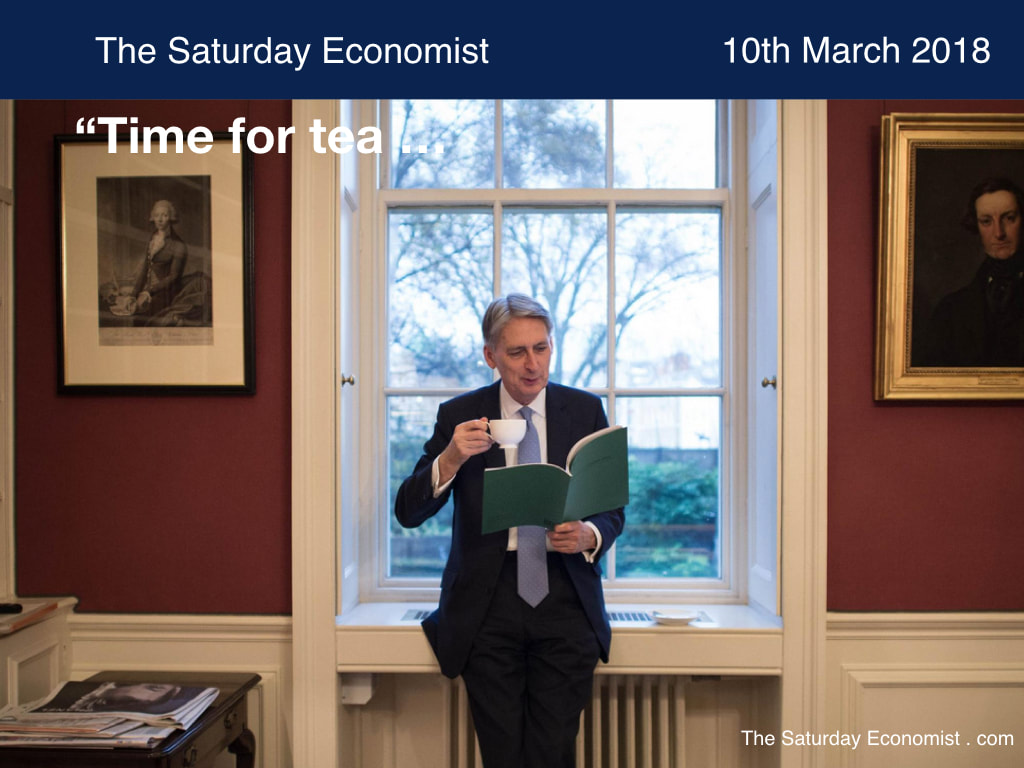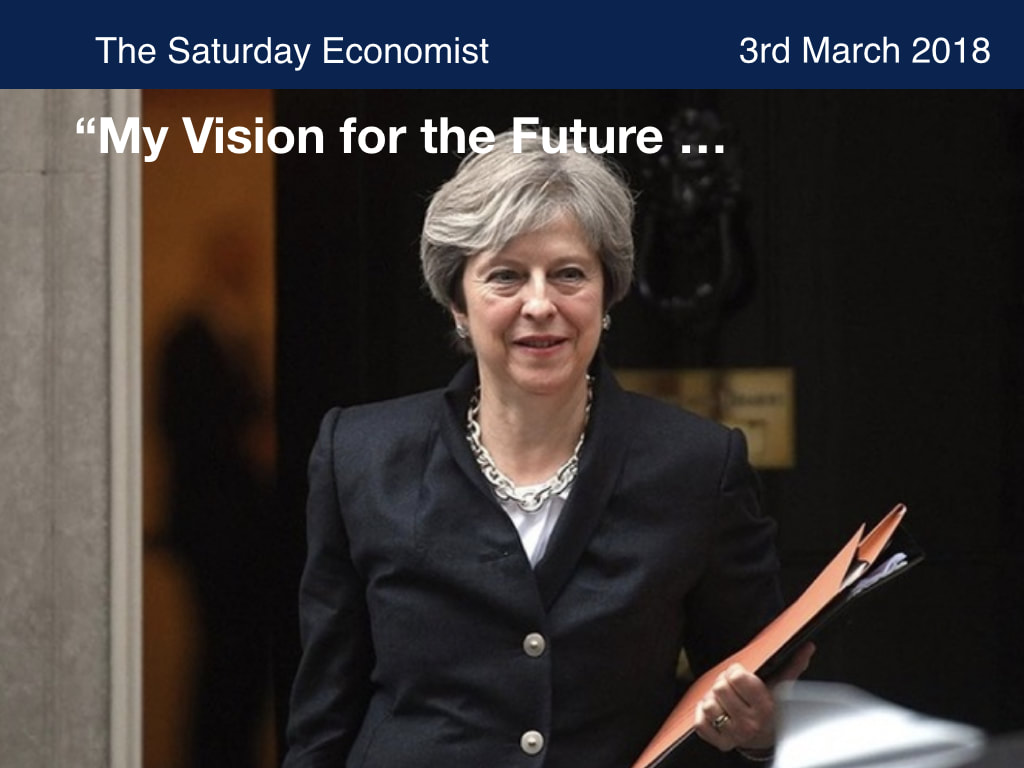|
The rate of inflation is falling. The pressure on real incomes is easing. The headline CPI rate fell to 2.7% in February down from 3.0% prior month. The impact of oil, commodity prices and the depreciation of Sterling is working it's way out of the inflationary spiral.
Goods inflation slowed to 3%. Service sector inflation fell to 2.4%. The latter is a measure of the slow down in the retail and leisure sector perhaps. Producer prices also eased back. Output prices increased by just 2.6%. Input costs increased by just 3.4%. The latter peaked at 20% in January last year. So is the worst over for now? Well yes we think so. Expectations are for headline inflation to average 2.4% by the end of the year and probably stay around that level into 2019. Good news for households. Earnings in the three months to January were 2.8%. The real income pressure, (CPI basis) will probably be eliminated in the first quarter. With earnings expected to rise towards 3% this year, the pressure on spending may ease slightly. Just as well for retailers. Volumes increased by just 1.5% in February. Values increased by 4%. The carnage in retail continues with store closures and defaults the trend in the high street and on the retail parks. Part of the reason of course is the continued penetration of online sales. In February, online sales increased by 14%, accounting for 17% of all retail action. Online food sales increased by 14%. Online sales currently account for just 5.5% of all food sales. The potential for further penetration is substantial. With home and drone deliveries, the "millennials" will shop on line using mobile phones to access the weekly "bulk shop" and "top up" treats. Unemployment figures were also released this week. Headline unemployment increased slightly as the overall rate fell to 4.3%. We are at or nearing full employment. Recruitment difficulties are increasing. Over 800,000 vacancies are challenging some 1.45 million out of work. Traditionally we analyse unemployment into cyclical, structural and frictional. It is clear cyclical levels are near lows, a higher level of structural and frictional job loss may well be in play. We may have seen the best in terms of the unemployment rate at least for this cycle. So inflation is falling, price pressures are easing, so what happens next with rates? Rates set to rise ... The Fed hiked rates this week. New Fed Chairman Jerome Powell moved to increase rates following upward revisions to US growth this year. Further rates are indicated in 2018. The Fed blue dot plot suggest US rates could rise to over 3% by 2020. Back in the UK, the MPC voted to hold rates. It was not unanimous. Two members of the committee voted to increase rates by 25 basis points. Most analysts now expect a UK rate rise in May. Further increases are now expected this year. Gertjan Vlieghe, a member of the MPC suggests borrowers should prepare for interest rates to rise to 2% over the next three years. Slow and steady increases, perhaps two in each year should be the guideline for cautious curation of debt. Whilst external inflation pressure are subsiding, domestic pressures are increasing. Wage pressures may become the new driver of pricing, or so it is thought. "Rate Normalisation" will become the new Central Bank mantra, slowly revealed as policy makers remain confident about growth. With a target inflation rate of 2% and a real rate premium of equal measure, gilt rates and short rates should return to 4% plus in the US and the UK. Yes, we are leaving Planet ZIRP! It's official. Ten year gilts closed sub 1.5% this week. The Debt Management Office is offering a 55 year bond deal and why not? Debt won't get much cheaper. In the US markets fell as concerns rise about a trade war with China. The adults are leaving the White House. The Day Care center is unattended. Trump's lead defense counsel is abandoning ship. John Dowd lead lawyer in the Mueller investigation claims, Trump is ignoring his advice and has parted company with the President. Changes are taking place ... Trump has appointed Peter Navarro to trade and John Bolton as head of National Security. Navarro is the author of "The Coming China Wars" and Bolton has long been an advocate of pre-emptive strikes on Iran and North Korea. "Peace in our time" may become "Peace in Pieces" anytime soon. A cheery thought ... oil and gold the beneficiaries in the short term ...
0 Comments
Time for the spring statement this week. The Chancellor's short speech was rendered yet shorter when "political content" was edited out by Treasury mandarins. He spoke for just twenty six minutes. Oh for the days of the "Spring Budget". There was something for which we would all sit up and take notice.
Remember when, the Chancellor would deliver the fiscal changes for the financial year ahead, just before the start of the financial year. It made sense. It could take some time. William Gladstone managed a four hour budget speech in 1853, sustained by sherry and egg. Yes, Chancellors were allowed to consume alcohol during the budget speech. Benjamin Disraeli would drink Brandy and water, Geoffrey Howe preferred a gin and tonic. Nigel Lawson opted for a white wine spritzer, Ken Clarke would drink whisky. Gordon Brown restored sobriety, with a penchant for Scottish mineral water. Phil Hammond was in good (non alcoholic) spirits. "I am at my most positively Tigger-like" today he said, "As I contemplate a country which faces the future with unique strengths." Yep like we all speak English, the Chancellor explained. And we live in a time zone which can speak with the East in the morning and the West in the afternoon, as Liam Fox pointed out last week. "An outward free trading nation, one that is confident our best days lie ahead of us". Excellent. The OBR is not quite so sure. Robert Chote plays "Eeyore" to Hammond's "Tigger". Forecast growth for the current year was upgraded to 1.5% but remained unchanged at 1.3% over the next two years. On borrowing the OBR is forecasting debt of £45 billion in the current year, falling to £37 billion in the next financial year. Strange that. Borrowing in the year to January was just £37.7 billion down by over £8 billion on prior year. Why so gloomy? The OBR is worried about Local Authority budgets. The Treasury not so much! "The nicest thing about the rain is that it always stops, then starts again" as Eeyore might say. It's the same with the forecast round. No sooner has one ended then the next one starts again. Growth in 2018 was 1.7% compared to the 1.5% forecast at the time of the budget. The OBR clearly got it wrong in November. "Forecasts are there to be beaten" said the Chancellor. "And we should make it our business to do so again". Yes even the Chancellor has concerns about the pessimistic outlook from the OBR. But then with Tigger and Eeyore, it was ever thus ... The Kindness of Strangers ... The Governor is worried, again, about the level of debt both internal and external. The current account deficit in the third quarter of the year was £22.8 billion. That's 4.5% of GDP. The FPC warned this week, Britain has become even more dependent on the "kindness of strangers" to fund the shortfall. The country is reliant on the confidence of foreign investors to offset the trade deficit by capital transfers and net investments into the UK. "The Kindness of Strangers with Inky Blots and Rotten Bonds Sustained" the message from the Cabinet Office in the 1930s. Pressure on Sterling with radical action on short rates the result. The Bank of England and the OBR are concerned about life post Brexit. The decision by Unilever to relocate the head office to Rotterdam this week will not help. The OBR is forecasting the level of HMG debt will peak at just under £1.9 trillion over the next five years. 25% of debt is held by the Bank of England, underwritten by Treasury and (owned) by government. The Bank is committed to a continued purchase scheme, to rollover bond purchases in the future. Not so for foreign holdings. 28% of gilts are held overseas, down from a peak of 35% in 2008. £500 billion of funding is at risk if foreign anxieties develop about truly global Britain. Foreign investors must be sure "Our best days lie ahead of us". Not too much to ask but some severe doubts along the way as the implications of leaving the EU begin to impact ... That's all for this week, (more Eeyore than Tigger) have a great week-end. The Chancellor will deliver his Spring statement on Tuesday. The Office For Budget Responsibility will upgrade forecasts for the UK economy. Revisions will be made to borrowing forecasts for the current year and the year ahead. The Chancellor will be smiling at the Despatch Box. The fiscal gods are delivering a revenue bonus.
We expect growth forecasts to be upgraded to 1.8% in 2018 but more caution may be evident in the subsequent years. The overhang of Brexit will weigh heavy on key investment decisions unless the fog of negotiations clears and soon. Borrowing in the current financial year is expected to fall below £40 billion with a further fall towards £30 billion in prospect next year. The internal and external deficits are improving simultaneously ... The latest trade figures confirmed the trade deficit in goods was £135 billion in 2017 unchanged on prior year. Weak domestic growth compared to strong growth in world trade is the primary reason. The trend was assisted by translation and elasticity effects from Sterling. The overall deficit for trade in goods and services fell to £28.3 billion from £40 billion in 2016. At less than 2% of GDP this is one thing less for the Chancellor to worry about. The figures (on goods particularly) will not look quite so strong this year. The latest data on manufacturing suggest the modest march of the makers continues. Growth in January was 2.7% following growth of 2.8% last year. We expect growth of 2.7% in the current quarter averaging 2.5% for the year as a whole. The expansion is largely in capital goods destined for overseas workshops around the world. Construction output increased by over 5% last year with a 9% growth in housing, a 7% growth in infrastructure and a near 5% growth in commercial real estate. Headlines today were focused on the poor performance in January. Output fell by 4% in the month compared to January last year. Should we worry too much about one month's figures? Not really, we expect growth of 3.0% this year despite the poor start to the year. The year looks to be well set for the Chancellor, not so good for David Davies.The negotiations with the EU took a step back this week. Punitive fines in prospect for failing to secure our borders, the EU is staking a claim on our fish and demanding a solution to the Irish question before talks continue. With just over one year to go, there is too much uncertainty for business. Contingency plans are now in motion ... businesses are beginning to plan for the worst ... Steeling for job losses ... Trump's decision to hike tariffs on steel and aluminium reverberated around the world this week. Gary Cohn, the Director of the National Economic Council and chief economic advisor to the President resigned. Peter Navarro, the Assistant to the President, Director of Trade and Industrial Policy, and the Director of the White House National Trade Council was jubilant. A trade hawk and author of "Death By China : Confronting the Dragon" Navarro had long been a trade sceptic. Trump demanded by Tweet a reduction of $1 billion in the near trillion dollar trade deficit with China. Detail never a strong point, the demand was upgraded to $100 billion in subsequent release. Cutbacks in covfefe quotas could only achieve so much presumably! Allies were appalled. Concessions were offered to Canada and Mexico to the exclusion and confusion of Japan and the EU. The EU threatened action on Orange Juice, Bourbon, Harley Davidson and Levi Jeans. Menopausal males across Europe faced a set back. The steel industry in the UK faced job losses in the £360 million trade across the pond. In a quiet week in the White House, Trump announced talks with Kim Jung-Un. Trump is acting as his own diplomat, negotiator and strategist in talks with North Korea. White House Staff were scrambling to react to Trump's response to the overture from "Rocket Man'. It all seems too much too soon. Trump is nervous as the Mueller investigation closes in and the "Stormy Daniels" scandal escalates. A President needs protection. Who would impeach a President as he saves the world from nuclear extinction and saves US Steel from a similar terminal fate. Good news for the President. The economy created 310,000 new jobs in February. The unemployment rate was unchanged at 4.1%. The rate of pay increase eased back to 2.6% from 2.9% in January. The Fed is confident about growth this year. Three if not four rate hikes are possible in 2018. The Fed will meet later this month. The first hike is expected in May. Rate "normalisation" will become the new central bank mantra. The Bank of England and the ECJ will soon get on message. Ten year bond rates jumped to 2.9%. UK ten year gilts moved up to 1.5%. Markets rallied after early year profit taking. The DOW still looks a little pricey but the fundamentals are in place for continued strength in main markets into Easter ... That's all for this week, have a great week-end, John The Prime Minister outlined the way ahead in a Mansion House speech yesterday. "We can work it out" the headline echoed in The Times" today. It's the title from an old Beatles hit ...
"Try to see it my way", the Fab Four lyrics continue ... "Do I have to keep on talking 'till I can't go on? The ominous refrain. Well probably, the answer. The speech moved the debate forward but it was no more than an agenda, with a wish list, without solution. The ten thousand words included some strong warnings to Tory back benches. Brexit means Brexit but it is not "an end in itself". We are leaving the single market and the customs union but ... We will still seek Free Trade Access for the important bits, offering regulatory alignment and subjugation to the European Court of Justice where applicable. Payment will be made for access to European institutions on Air Safety and the Medicines Agency. We will also want to explore with the EU, the terms on which the UK could remain part of EU agencies that are critical for the chemicals, medicines and aerospace industries. We accept this would mean abiding by the rules of those agencies and making an appropriate financial contribution. UK law may not necessarily be identical to EU law, but it should achieve the same outcomes and in some cases might be identical. We are leaving the Common Fisheries Policy. We will regain control over our domestic fisheries and access to our waters but we will continue to share the fish. "It's all a question of scale!" Fudge over Ireland, no mention of a transition period. Partial inclusion in a customs union but free to set tariffs with the rest of the world for goods for domestic consumption (not for re export). A commitment to ensure that the relevant UK regulatory standards remain at least as high as the EU. On Thursday night, I listened to Greg Clark the Secretary of State for Business, Energy and Industrial Strategy in his speech at the Mansion House. It was reassuring. "I hear loud and clear, three things in particular businesses need from our EU negotiations." he said ... "First, the implementation period needs to be agreed; Second, tariff and friction free trade is required; and third regulatory alignment is desired. Above all businesses require certainty for the three years ahead. The Prime Minister's speech moved the agenda forward. It was a demonstration of the complexity of issues and the challenges of negotiation. It is a clear message there will be no hard Brexit. We will have (partial) access to the single market, (partial) inclusion in the customs union, (partial) regulatory alignment, (partial) payments made to the EU, (partial) submission to the ECJ and (partial) free movement and rights for EU citizens. A truly (partial) global Britain, taking back control making the sovereign decision to give some of it back again. A Global Britain which thrives in the world by forging a bold and comprehensive economic partnership with our neighbours in the EU, and reaches out beyond our continent, to trade with nations across the globe. Excellent! So why are we leaving exactly? "Try to see it my way, Only time will tell if I am right or I am wrong ..." A level playing field or flat lining ... Jerome Powell the new Chairman of the Fed was in bullish mode this week. A strong recovery without signs of inflation prompted hints of at least three US rate rises this year. Ten year US bond yields closed at 2.9%, UK LIBOR closed at 2%. UK gilts hovered around 1.5%. We are leaving Planet ZIRP, it is time to buckle up. The Bank of England admitted this week, one of the side effects of QE and life on Planet ZIRP was to inhibit investment (and damage productivity). Corporate funds were diverted to shore up pension fund deficits, a result of soaring bond prices and the miserable yields generated as a result. The IMF had been bullish about world trade with growth of over 5% in prospect this year. Then came the Trump tantrum on trade. Another "Defiance Disorder Order", committing the US to 25% import tariffs on steel and a 10% tariff on aluminium. No discussion with policy advisers, no formal review of policy implications. The President was in a fury and decided to act. Hope Hicks had resigned, Jared and Ivanka are heading for the exit, the Mueller investigation is closing in. The President tweeted the declaration of a trade war. Gary Cohn, Director of the National Economic Council and chief economic advisor to the President is threatening to walk. US steel applauded. Domestic manufacturers, from cars to beer, booed. The move is inflationary, alienating allies in the process. Canada and Brazil will be the worst affected. China and the EU threaten retaliation. Blue Jeans and Soybeans could be the obvious target. US bond sales could be the weapon of last resort for China and Japan. The President reassured "Trade Wars are easy to win". The pursuit of a level playing field, for steel, will come at a heavy price. Time for adult supervision, to put the President back in his play pen before it's too late ... That's all for this week, have a great week-end, John |
The Saturday EconomistAuthorJohn Ashcroft publishes the Saturday Economist. Join the mailing list for updates on the UK and World Economy. Archives
July 2024
Categories
All
|
| The Saturday Economist |
The material is based upon information which we consider to be reliable but we do not represent that it is accurate or complete and it should not be relied upon as such. We accept no liability for errors, or omissions of opinion or fact. In particular, no reliance should be placed on the comments on trends in financial markets. The presentation should not be construed as the giving of investment advice.
|
The Saturday Economist, weekly updates on the UK economy.
Sign Up Now! Stay Up To Date! | Privacy Policy | Terms and Conditions | |




 RSS Feed
RSS Feed